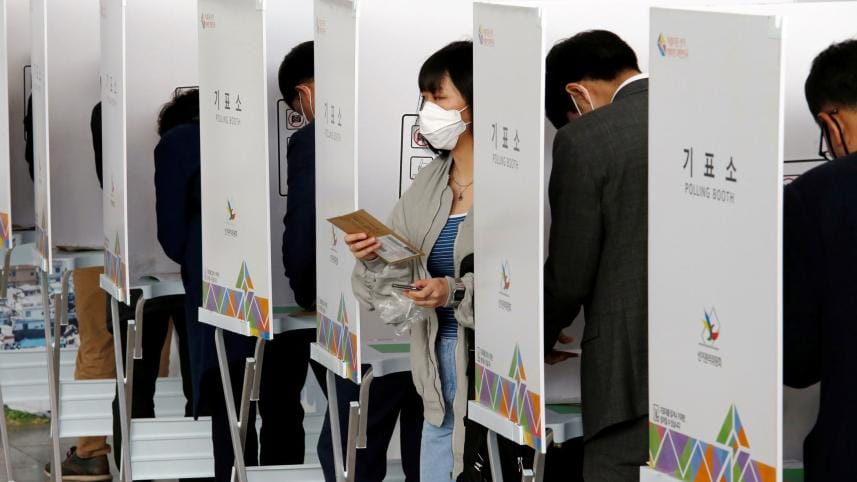Covid-19, constitutional crisis and rise of authoritarianism

Like all other sectors and spheres of activity, elections and democracy have become the victims of Covid-19 since its outbreak earlier this year. Due to the unprecedented crisis caused by the global health emergency, leaders across the world are focusing mainly on people's lives and livelihoods, while setting elections and such democratic practices aside. Between January and June of this year, at least 10 national parliamentary and two presidential elections, six nationwide referendums and thousands of local elections and by-elections have been postponed due to the pandemic. Although fresh dates have been announced for some of the deferred elections, most of the elections have been postponed indefinitely. As a result, both elections and democracy are now "in quarantine" in many countries; no one knows when this prolonged quarantine will end.
In some countries, postponement of elections has created a constitutional crisis. Sri Lankan parliamentary elections, initially scheduled to be held on April 25, were rescheduled twice and are now expected to be held on August 5. Delaying elections due to Covid-19, the country faces a constitutional crisis as article 70 of Sri Lanka's constitution states that a general election must be held and a new parliament seated within three months of the dissolution of the former parliament. As its parliament was dissolved on March 2 but no election was held within three months, President Gotabaya Rajapaksa is running the government without parliamentary oversight.
At least 84 countries have declared a state of emergency in response to the pandemic, leading not only to suspension of democratic rights but also to fears about misuse of power. In Thailand, the government not only declared a state of emergency and imposed curfew, it also issued several orders and announcements that curb freedoms, rights and liberties of its citizens. The opposition, Move Forward Party, did not oppose the state of emergency in order to curb Covid-19 cases. However, the party proposed a bill to amend the 2005 state of emergency decree to make the government accountable, to be checked by the legislative and judicial branches. Several rights activists are against the state of emergency declaration and continue to protest outside the Civil Court in Bangkok, seeking an order requiring the government to adhere to normal laws to control Covid-19 instead of an executive emergency decree.
Along with postponement of elections and declaration of state of emergency, a few countries "witnessed an unmistakable authoritarian surge, in which leaders around the globe have manipulated the coronavirus threat to consolidate their own political power and to run roughshod over democracy and human rights." Therefore, The Washington Post, on April 13, wrote that "as leaders seize powers to fight coronavirus, fear grows for democracy." Similarly, an April 28 Foreign Policy article posited that "the pandemic provides ample opportunity to accelerate an evident trend toward authoritarianism." There are illustrative examples in support of these statements.
Hungary declared a state of emergency due to Covid-19 on March 11. Later, despite courageous protests from local human rights groups, the Bill on Protection Against Coronavirus, which has no sunset clause, was passed by parliament giving Prime Minister Viktor Orban the right to rule by decree for as long as he deems fit. The bill not only suspended elections and referendums indefinitely, it also authorised the government to decide when, or if, to end the state of emergency, which has turned the country into the European Union's first coronavirus autocracy. Israel's prime minister has shut down courts and instituted intrusive surveillance of citizens. Chile has deployed the military to clear public squares once occupied by protesters. Russian President Vladimir Putin has firmly consolidated his power as he expanded his formidable apparatus of state repression in many ways including changes to the constitution that enable him to stay in power up to 2036. This was passed with public support. However, the election was marred by numerous voting irregularities.
While postponement of elections and suppression of civil liberties are problematic, holding elections during this time is also troublesome. A few countries have gone ahead with elections in the time of Covid-19, but the credibility of these elections is questionable. Held on June 21, the Serbian parliamentary election was the first national poll in a European country since the Covid-19 lockdown. It was boycotted by most of the opposition saying that taking part in the vote amid the coronavirus pandemic and without a free media around would only legitimise the government in what they called a "hoax vote." However, the Organization for Security and Co-operation in Europe (OSCE) visited a limited number of polling stations and found voting processes appearing to be smooth and administered efficiently, despite challenges posed by the Covid-19 pandemic. The turnout was roughly 48 percent, the lowest since the establishment of a multi-party system in Serbia in 1990.
But South Korea is a country that showed the world how to hold elections and continue democratic processes during a pandemic. The Korean legislative election, which was held on April 15, saw a 66.2 percent voter turnout—the highest since 1992. Along with voting at the polling stations, the country arranged mail voting as well as early voting at special polling stations for Covid-19 patients, voting for self-quarantined voters at certain times on the election day. All the polling stations were disinfected, and voters were instructed to stand at least three feet apart, with lines carefully marked on the floor. All voters had their temperature taken, and those with temperatures above 37.5 degrees Celsius were taken from the regular line and directed to separate booths. In India, a series of Rajya Sabha elections were held on June 19, 2020.
Holding elections during a pandemic is not new. In 1918-20, during the height of the Spanish flu, which killed hundreds of thousands of Americans—with a total of 195,000 Americans dying in the month of October alone—elections were held on November 5, 1918 with around 40 percent turnout. During campaigning, candidates maintained social distancing, and on election day, voters and poll workers were required to wear masks.
Regular, credible democratic elections are fundamental to the proper functioning of a modern representative democracy. Therefore, election experts around the world are encouraging holding elections adjusted for the new normal with the suggestion to focus on how to protect the health of the democracy while protecting the health of the people. For saving both democracy and people's lives, pandemic-time elections can be held by including online nomination, virtual campaigning through social and print media, radio and TV, even using banners, posters and leaflets, instead of door-to-door physical campaigning that might increase infection. For election day, along with fumigating the polling stations, voting hours may be extended and additional polling stations may be set up to avoid large gathering of voters. Some countries are also using mobile voting, postal voting, advance voting, etc.
Bangladesh, considering its political and social contexts, could consider some of these practices and make the required changes to the legal framework to hold genuine, legitimate democratic elections during the pandemic, which are of paramount importance to the democratic process.
Dr Md Abdul Alim is an election specialist.
Email: alim.abdul3492@gmail.com




 For all latest news, follow The Daily Star's Google News channel.
For all latest news, follow The Daily Star's Google News channel.
Comments